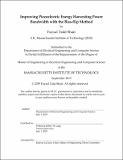Improving piezoelectric energy harvesting power bandwidth with the bias-flip method
Author(s)
Shair, Faysal Talal.
Download1138947472-MIT.pdf (9.737Mb)
Other Contributors
Massachusetts Institute of Technology. Department of Electrical Engineering and Computer Science.
Advisor
Jeffrey H. Lang.
Terms of use
Metadata
Show full item recordAbstract
Vibration energy harvesters may be used as robust and reliable sources of energy for low-power devices such as wireless sensors. Of the many type of vibration energy harvesters, the piezoelectric energy harvesting device (PEHD) is favored for its high energy density and ability to self-start. As a high-Q resonant system, however, a PEHD delivers substantial power only when the ambient vibration frequency matches the PEHD's resonant frequency. Unfortunately, manufacturing uncertainties, and variations in ambient vibration frequency make this frequency match an unrealistic pursuit. The bias-flip style of power electronics is examined as a means to extend the frequency range over which considerable power can be harvested. Comprised of a switch and small inductor, bias-flip power electronics act as a much larger tunable inductor that can come very close to cancelling out the PEHD net capacitive impedance, thereby implementing a nearly complex-conjugated matched load. The bias-flip electronics showed a power improvement of ~2.5x at resonance and ~5.6x at 5 Hz away from resonance, when compared to the optimal resistive load at the end of a full-bridge rectifier. This thesis examines the Bias-flip method in detail and experimentally evaluates its effectiveness in extending power bandwidth. In the final section we test the bias-flip power electronics' resiliency in an environment with multiple vibration frequencies.
Description
This electronic version was submitted by the student author. The certified thesis is available in the Institute Archives and Special Collections. Thesis: M. Eng., Massachusetts Institute of Technology, Department of Electrical Engineering and Computer Science, 2019 Cataloged from student-submitted PDF version of thesis. Includes bibliographical references (pages 130-131).
Date issued
2019Department
Massachusetts Institute of Technology. Department of Electrical Engineering and Computer SciencePublisher
Massachusetts Institute of Technology
Keywords
Electrical Engineering and Computer Science.